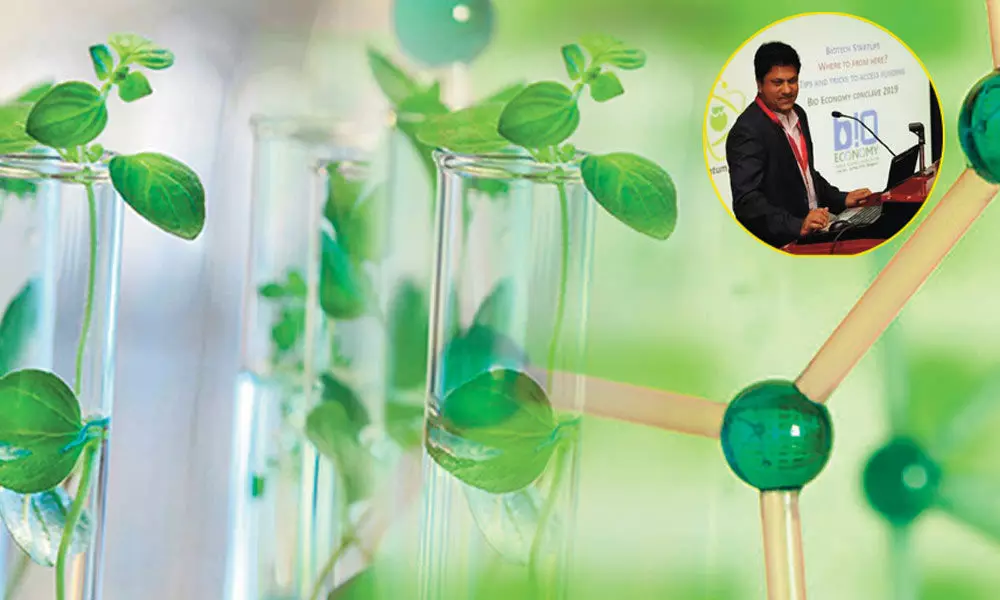Live
- 25% rise in internship opportunities observed in 2024: Survey
- Scholarships For Students
- Student Survives a Near-Fatal Accident at Pallavi Model School
- Prisoner in Sangareddy Central Jail Suffers Heart Attack
- Targeting gut cells may open new way to reduce depression & anxiety
- ‘Daaku Maharaaj’ to kickstart musical promotions
- ‘Game Changer’ team teases with a new promo
- Nara Lokesh emphasises overhaul of govt. schools and mid-day meal program
- Amid turmoil, air pollution peaks in Bangladesh as temperatures fall
- Google Trends unveils list of most searched ‘Indian Movies of 2024’
Just In
Bengaluru start-up develops unique biocatalysts


Bengaluru start-up develops unique biocatalysts
Unlike metal-based catalysts that rely on harsh, energy-intensive processing, an Indian start-up named Quantumzyme has developed pioneering biocatalysts that grow the activation rate by up to 150 times and are easily biodegradable
Bengaluru: With rising global demand, the need for sustainable manufacturing processes is now greater, more than ever. But with conventional chemical catalyst-based industrial manufacturing; these processes have an adverse impact on the environment.
The challenge today is not stepping up manufacturing; but moving to sustainable manufacturing processes that use raw materials efficiently, eliminates waste, and avoids the use of toxic materials.
While many researchers, start-ups, and enterprises are making constant attempts towards sustainable manufacturing, an Indian start-up named Quantumzyme has been making waves recently with its technology for green chemistry and promoting enzyme-based manufacturing.
While there are intermittent clashes with our neighbours over border rows, an alternative race is on over who's the next manufacturing giant. As Narendra Modi, Prime Minister, India, stated that India is the biggest vaccine manufacturer in the world - it has to be ensured that this leap doesn't come at the expense of our environment.
Unlike metal-based catalysts that rely on harsh, energy-intensive processing, Quantumzyme has developed pioneering biocatalysts that grow the activation rate by upto 150 times and are easily biodegradable.
The company has developed an in-house framework, named "QZyme Workbench™", that enables in-silico or Computer-aided enzyme engineering, effectively reducing the turnaround time and raw materials required, while elevating the process efficiency.
The platform supports the entire process of development from identification to engineering and providing sequences that can be taken to the lab to perform experiments and scaled up for manufacturing. It uses proprietary algorithms, necessary to carry out substitutions of appropriate amino-acid residues that are instrumental in performing the biocatalytic reaction.
According to a recent ACS Catalysis report, the QZyme workbench enabled detection of bottleneck residues which hindered the rate of reaction - and with minor mutations, a 200-fold increase in the production of end-product was observed with high stereo-specificity.
Quantumzyme CEO Naveen Kulkarni stated, "As India steps up its manufacturing processes, it is imperative that we keep the well-being of our environment in mind. With Quantumzyme, we envision a future free from chemical catalysts that are inherently cumbersome, and release harmful byproducts. With enzyme-based biocatalysts, we will eliminate just that."
He believes that biology not just helps with sustainability - but is a potential manufacturing platform for a trillion dollar global market opportunity. Kulkarni was felicitated with "Most Innovative Idea" by the Bill and Melinda Gates Foundation, along with several other accolades from the likes of Economic Times, Government of Karnataka, among others. A regular contributor to leading journals like Nature, ACS Bio catalysis, etc., Kulkarni served as the CEO of Biotech Startups, and before that, was Director at Philips Research and associated primarily with the healthcare and energy sector. "While we gradually overcome this COVID-19 crisis and transform back to normal, it is imperative that we are ready for any such crisis like these in the future. And so we need more such research-driven setups like Quantumzyme that help the nation grow without any adverse impact on the environment," he added.

© 2024 Hyderabad Media House Limited/The Hans India. All rights reserved. Powered by hocalwire.com






